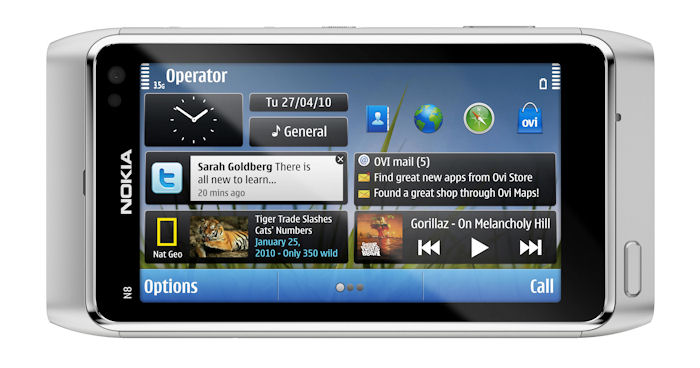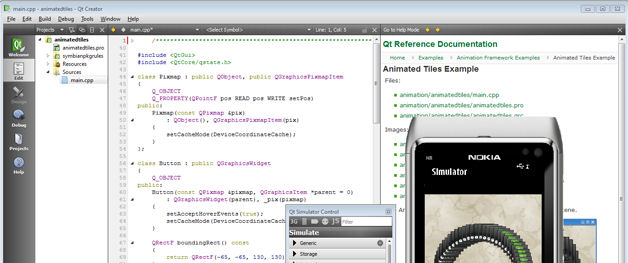Nokia highlighted Qt's robustness and status as a tried and tested framework, together with its ability to quickly create rich, intuitive and visually attractive applications.
"Nokia is focusing on Qt as a robust, tried and tested framework that unlocks the hardware, software and service capabilities of the existing Nokia smartphone range as well as creating huge opportunities for future Symbian and MeeGo products. Nokia's introduction of Qt Quick into the Qt framework enables the more rapid creation of rich user interfaces and the most visually engaging applications."
Nokia also announced its attention to support HTML 5 for web content and application development across both Symbian and MeeGo. This will be achieved through support for HTML 5 in its web browsers and the built-in HTML 5 support in Qt. This should allow Nokia devices to fully support web-based applications and allow web developers to create applications for Nokia's platforms using standard web technologies, a continuation of the strategy that Nokia has followed with Web Runtime (WRT) and its Web SDK.
Nokia also announced the streamlining of the Nokia Symbian Smartphone and Nokia Services organisations, which will result in 1,800 job losses (approximately 1,200 and 600 respectively) and, in part, are the result of the efficiencies that Nokia believe can be brought about by an increased use of Qt in its platform and internal development.
In the Symbian Smartphone organisation, the use of common tools for application development will be expanded. There will be a focus on responsiveness to consumer demands and a reduced time to market. In the Nokia Services organisation there will be a focus on delivering an integrated Ovi experience, rather than distinct end-to-end service lines.
Implications for consumers
With a unified and simplified developer offering, consumers can expect to see an increase in the number and diversity of applications available for their device. We can expect to see popular applications and games being available on both Symbian and MeeGo devices in similar time frames because the effort of porting from one to the other will be greatly reduced.
In the press release Nokia stated:
One benefit of this simplified approach is that planned and future improvements in Symbian will be developed in Qt and will be compatible with the existing Symbian^3 platform release. This means that Nokia's continued commitment to develop the Symbian platform will benefit not only future users of Symbian-based products, but will result in updates and upgrades for existing Symbian^3 users. The resulting change to a model of continuous evolution replaces the previous release-based model.
Reading between the lines, this indicates that we can expect to see many of the changes scheduled for what was Symbian^4 to be available for devices such as the Nokia N8 and C7. The major element of Symbian^4, scheduled for 2011, is a reworking of the user interface and its underlying graphical elements. Nokia Conversations is more explicit:
Even more importantly, you can buy a Nokia smartphone confident that any improvements introduced later to the Symbian platform, such as the user interface, can be made available to download on your device as well. No need to wait for Symbian^4 — the improvements we were planning for Symbian^4 will be introduced as and when they become available.
The exact details of how this will be delivered remain unclear. Some elements will be delivered ahead of others. For example, a renewed browser and updates to the Qt framework are likely to be accelerated. This is very good news for consumers and significantly enhances the value and shelf life of existing Symbian^3 devices.

Symbian^3 devices, like the N8, will get improvements originally planned for Symbian^4
Nokia go on to say that:
Nokia will no longer refer to Symbian^3 or Symbian^4. The benefit to consumers will be a constant improvement in the experience of their Symbian-based Nokia products.
There are no specifics on what these 'constant improvements' may involve, but it is likely many of them will be based on the Symbian^4 vision.
This does mean that there will not be new 'versions' of Symbian going forward, from a technical nomenclature point of view, but changes will happen in a stream, rather than steps. Ultimately, this is a change in the way that Nokia 'productises' Symbian for its devices, one that reflects the increasingly time sensitive demands of today's smartphone market.
Nokia will be changing the messaging used to present the platform (i.e. how Nokia talks about it). This means that consumer perception of Symbian will change from a platform with a periodic release cycle to a platform with continuous, iterative improvement. You can expect to see Nokia refer to this as the 'new Symbian'.
Nokia remains solidly committed to the Symbian platform:
"Nokia is committed to the Symbian platform, which is still the worlds most used smartphone platform. As was emphasised in today's quarterly update to Nokia investors and media, we have a strong portfolio of Symbian Smartphones including the N8 and C7, which are now shipping, as well as the E7 and C6-01, which will ship by the end of 2011. Nokia continues to expect to sell more than 50 million devices using the new Symbian."
Implications for developers
Today's announcement is about the need to accelerate the evolution of the platform, as waiting for the step change to Symbian^4 is insufficient in the current highly competitive mobile marketplace. However, it also reflects a Qt future, where the operating system becomes less important, or at least less visible, than the application framework that sits on top of it.
Nokia have been pushing Qt quietly for the last year and it has been clear for some time that it is at the heart of its future strategy. The intention for Qt to become the main development environment for both MeeGo and Symbian was made clear more than a year ago. Today it becomes clear that Nokia will try to accelerate this as much as possible in order to deliver a better experience to both consumers and developers.
Nokia is essentially promising developers that if they create applications and services in Qt, QML or HTML 5 then they will run across both of its key software platforms: Symbian and MeeGo. Moreover, they will supported going forward, with Nokia offering a a commitment to ensure that applications built today will keep running on their platforms in the future.

Developers: Nokia Qt SDK is your new best friend.
To a large extent, this demonstrates an operating system agnostic approach. Qt becomes the over-arching and most important element of the software platform strategy. However the operating system will remain a crucial enabler and it is important to realise that it remains a critical part of the software stack in terms of capabilities and integration (i.e. you can't just switch it out without any thought).
The news that Symbian^3 devices will receive many of the updates that were previously grouped in Symbian^4 raises some interesting questions. Nokia has not made it clear what the future updates might include, so it is difficult to draw any final conclusions.
The current Symbian^4 UI plans are based on Qt and involve the deprecation of AVKON and the switch to Orbit. Switching existing devices from one UI to the other would involve significant technical challenges. For example, what would happen to AVKON-based applications that the user had already installed, and how would data stores be converted across?
Update: A comment below suggests that Orbit development has been discontinued. Instead a pure Qt and Qt Quick approach will be used. We will try and confirm this and talk about the implications, watch this space.
However one thing comes through loud and clear. If you want to develop applications for future (and many existing) Nokia devices you should be using Qt.
Rich Green, Nokia's CTO, interviewed
Nokia have published a video interview with Rich Green, Nokia's CTO, where he explains some of the implications of this strategy change:
"Qt is a technology that we acquired, a few years ago, from Trolltech. It is a well proven platform that has been used to tie together desktop platforms - and now mobile platforms. One of the values is that it can tie together our Symbian^3 platform and subsequent versions of Symbian as well as the MeeGo platform. In doing so, it can provide a contiguous platform for developers to build applications on.
For the Symbian platform, I think this really means we are doubling down our efforts on the platform itself. By adding Qt technologies and high performance browser technology, we are expressing, essentially, our commitment to that platform for end users, for forthcoming devices, and for developers.
This is a big step forward for Nokia. In the past, we haven't had so much of a commitment to developers to support them going forward. This creates an implicit contract with developers that says 'if you write an application for our platform using Qt, QML and HTML5 we will support that application going forward'. No changes of APIs, a commitment to ensure that applications built today will keep running on our platform, and that's an enormously valuable commitment to the developer ecosystem."
